葛底斯堡演讲(“The Gettysburg Address”)的文体分析
《葛底斯堡演讲》三个中文译本的对比分析
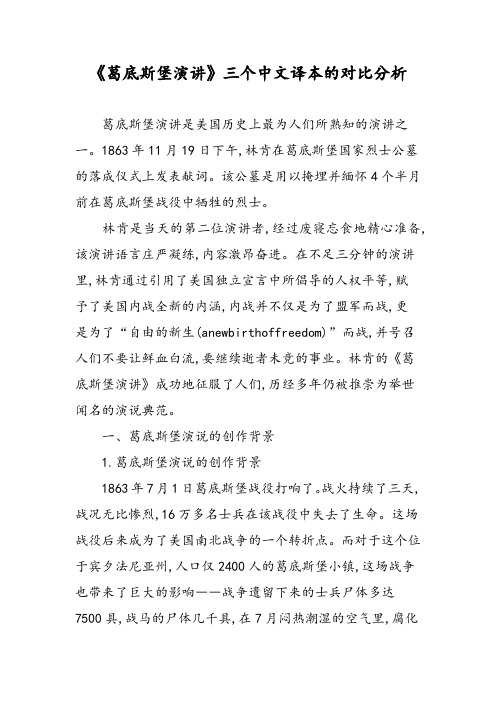
《葛底斯堡演讲》三个中文译本的对比分析葛底斯堡演讲是美国历史上最为人们所熟知的演讲之一。
1863年11月19日下午,林肯在葛底斯堡国家烈士公墓的落成仪式上发表献词。
该公墓是用以掩埋并缅怀4个半月前在葛底斯堡战役中牺牲的烈士。
林肯是当天的第二位演讲者,经过废寝忘食地精心准备,该演讲语言庄严凝练,内容激昂奋进。
在不足三分钟的演讲里,林肯通过引用了美国独立宣言中所倡导的人权平等,赋予了美国内战全新的内涵,内战并不仅是为了盟军而战,更是为了“自由的新生(anewbirthoffreedom)”而战,并号召人们不要让鲜血白流,要继续逝者未竞的事业。
林肯的《葛底斯堡演讲》成功地征服了人们,历经多年仍被推崇为举世闻名的演说典范。
一、葛底斯堡演说的创作背景1.葛底斯堡演说的创作背景1863年7月1日葛底斯堡战役打响了。
战火持续了三天,战况无比惨烈,16万多名士兵在该战役中失去了生命。
这场战役后来成为了美国南北战争的一个转折点。
而对于这个位于宾夕法尼亚州,人口仅2400人的葛底斯堡小镇,这场战争也带来了巨大的影响――战争遗留下来的士兵尸体多达7500具,战马的尸体几千具,在7月闷热潮湿的空气里,腐化在迅速的蔓延。
能让逝者尽快入土为安,成为该小镇几千户居民的当务之急。
小镇本打算购买一片土地用以兴建公墓掩埋战死的士兵,然后再向家属索要丧葬费。
然而当地一位富有的律师威尔斯(DavidWills)提出了反对意见,并立即写信给宾夕法尼亚州的州长,提议由他本人出资资助该公墓的兴建,该请求获得了批准。
威尔斯本打算在10月23日邀请当时哈佛大学的校长爱德华(EdwardEverett)来发表献词。
爱德华是当时一名享有盛誉的著名演讲者。
爱德华回信告知威尔斯,说他无法在那么短的时间之内准备好演讲,并要求延期。
因此,威尔斯便将公墓落成仪式延期至该年的11月19日。
相比较威尔斯对爱德华的盛情邀请,林肯接到的邀请显然就怠慢很多了。
首先,林肯是在公墓落成仪式前17天才收到邀请。
gettysburg address 语言特点
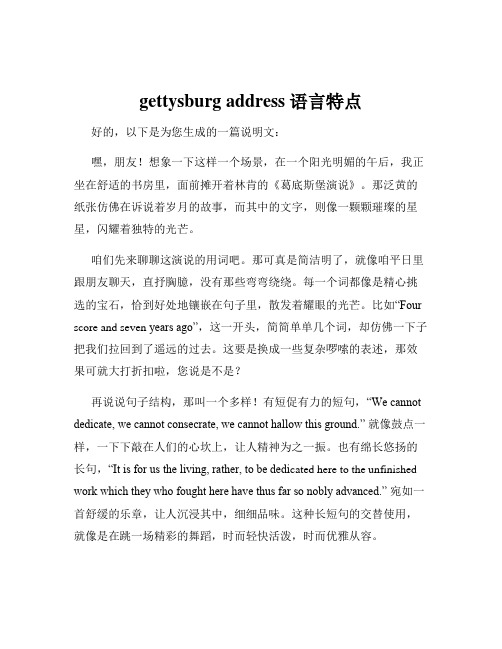
gettysburg address 语言特点好的,以下是为您生成的一篇说明文:嘿,朋友!想象一下这样一个场景,在一个阳光明媚的午后,我正坐在舒适的书房里,面前摊开着林肯的《葛底斯堡演说》。
那泛黄的纸张仿佛在诉说着岁月的故事,而其中的文字,则像一颗颗璀璨的星星,闪耀着独特的光芒。
咱们先来聊聊这演说的用词吧。
那可真是简洁明了,就像咱平日里跟朋友聊天,直抒胸臆,没有那些弯弯绕绕。
每一个词都像是精心挑选的宝石,恰到好处地镶嵌在句子里,散发着耀眼的光芒。
比如“Four score and seven years ago”,这一开头,简简单单几个词,却仿佛一下子把我们拉回到了遥远的过去。
这要是换成一些复杂啰嗦的表述,那效果可就大打折扣啦,您说是不是?再说说句子结构,那叫一个多样!有短促有力的短句,“We cannot dedicate, we cannot consecrate, we cannot hallow this ground.” 就像鼓点一样,一下下敲在人们的心坎上,让人精神为之一振。
也有绵长悠扬的长句,“It is for us the living, rather, to be dedi cated here to the unfinished work which they who fought here have thus far so nobly advanced.” 宛如一首舒缓的乐章,让人沉浸其中,细细品味。
这种长短句的交替使用,就像是在跳一场精彩的舞蹈,时而轻快活泼,时而优雅从容。
还有啊,这演说中的修辞手法用得那叫一个妙!“The world will little note, nor long remember what we say here, but it can never forget what they did here.” 这一对比,难道不让您感受到了那些英勇战士的伟大与不朽?就好像我们在生活中,会轻易忘记一些琐碎的话语,但那些刻骨铭心的行动,却永远刻在了心里。
林肯的葛底斯堡演说词的文体分析

特的特征 。从形式上看 , 演讲词 的表达形式更加简洁 有力。为 了使演讲稿 中的每个符号都能清楚地表达
( 二) 句法结构分 析
对林 肯的葛底斯堡演说词进行详细探讨分析 。
一
、
演说 词语 法分 析
பைடு நூலகம்
有1 0 个词。最长的句子长度是最短句子的 8 倍, 包 含6 个分句 。这篇演讲 稿大多句子的词量在 2 0 ~ 3 O
NO V . 2 0 2 01 6
d o i : 1 0 . 3 9 6 9  ̄ . i s s n . 1 0 0 8 - 9 6 4 0 . 2 0 1 6 . 1 1 . 0 2 9
林 肯 的葛底斯 堡演 说词 的文体 分析
张 志 琴
( 太 原师 范学 院 外语 系 , 山西 太原 0 3 0 0 1 2 )
一
“ t h a t ” 引导的并列成分 中, 还包含两个定语从句 , 一
个 宾语 从 句 。
第一 , 演说词一般都具有书面语特点 , 一般情况
下, 词汇都偏复杂 , 但经过研究可以发现, 这篇演讲词 此外 , 按照语气进行划分 , 句子还可 以分为陈述 没有较多难词, 演讲词的难度指数是 1 3 . 4 。为了使不同 句、 感叹句 、 祈使句和疑问句 。由于祈使句 能产生煽 文化水平、 各阶层的听众都能明白自己的意图, 林肯在
摘
要: 林肯的葛底斯堡演说词语言结构较 为复杂, 词汇难度 虽然不大, 但整体呈现较为庄重且生动容易
理解。本研 究以林肯于 1 8 6 3 年1 1 月1 9 号在葛底斯堡的演说词为研究对象, 从 演说词的语法、 词汇和修辞三 方面探讨该演说词的特点 , 以期为读者深入理解该演说词提供参考。 关键词 : 葛底斯堡演说词; 文体 ; 语 法; 词汇; 修辞 中图分 类号 :H 3 1 5 文 献标 识码 :A
葛底斯堡演讲(“TheGettysburgAddress”)的文体分析
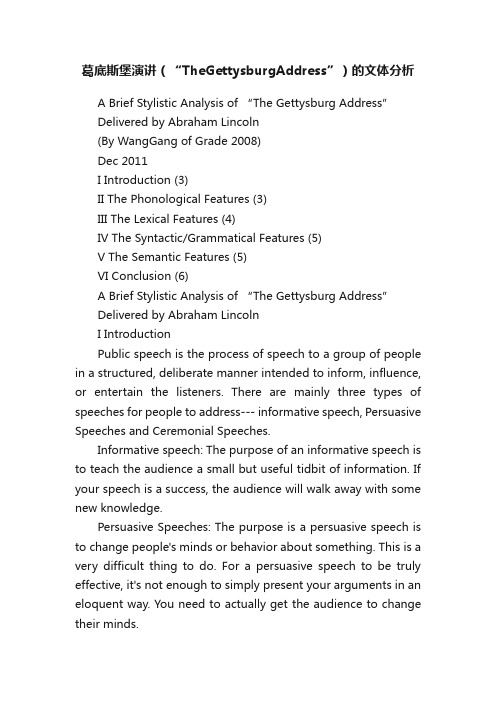
葛底斯堡演讲(“TheGettysburgAddress”)的文体分析A Brief Stylistic Analysis of “The Gettysburg Address”Delivered by Abraham Lincoln(By WangGang of Grade 2008)Dec 2011I Introduction (3)II The Phonological Features (3)III The Lexical Features (4)IV The Syntactic/Grammatical Features (5)V The Semantic Features (5)VI Conclusion (6)A Brief Stylistic Analysis of “The Gettysburg Address”Delivered by Abraham LincolnI IntroductionPublic speech is the process of speech to a group of people in a structured, deliberate manner intended to inform, influence, or entertain the listeners. There are mainly three types of speeches for people to address--- informative speech, Persuasive Speeches and Ceremonial Speeches.Informative speech: The purpose of an informative speech is to teach the audience a small but useful tidbit of information. If your speech is a success, the audience will walk away with some new knowledge.Persuasive Speeches: The purpose is a persuasive speech is to change people's minds or behavior about something. This is a very difficult thing to do. For a persuasive speech to be truly effective, it's not enough to simply present your arguments in an eloquent way. You need to actually get the audience to change their minds.Ceremonial Speeches: A ceremonial speech is one that is given to mark an important occasion in someone's life, such as a graduation speech, a wedding toast, or a eulogy at a funeral. These speeches can be both emotionally moving and fun.This linguistic description is about the analysis of The Gettysburg Address. The Gettysburg Address is a speech by U.S. President Abraham Lincoln and is one of the most well-known speeches in United States history.[1] It was delivered by Lincoln during the American Civil War, on the afternoon of Thursday, November 19, 1863, at the dedication of the Soldiers' National Cemetery in Gettysburg, Pennsylvania, four and a half months after the Union armies defeated those of the Confederacy at the Battle of Gettysburg. Abraham Lincoln's carefully crafted address, secondary to other presentations that day, came to be regarded as one of the greatest speeches in American history. In just over two minutes, Lincoln invoked the principles of human equality espoused by the Declaration of Independence and redefined the Civil War as a struggle not merely for the Union, but as "a new birth of freedom" that would bring true equality to all of its citizens, ensure that democracy would remain a viable form of government, and would also create a unified nation in which states' rights were no longer dominant.II The Phonological FeaturesMany speeches use parallelism and antithesis to make langue be with the rhythmof music. So we can’t ignore the phonological features of speeches. Because this is a political speech with the features of rigorous logic, refined langue, strength and charisma. In the beginning, “Fourscore and seven years ago”replaces eighty-seven years ago is the ingenuity of Lincoln that “fourscore” hastwo long vowels [o:] which is resounding and well known by people, and can draw audience’s attention effectively. If substitute [ei] of eighty-seven with [o:] of “Fourscore”, it can’t reach such an effectiveness as [o:]. Except this, we can also see amounts of vocabulary with resounding vowels, such as fourscore,now,that nation,any,that nation might live,cannot,tally did,nobly,great,before,God,new birth,of,by,for,perish and so on. All of the lexis enhance volume and make listeners catch the point of the speech easily. At the transition of speech, improving the intonation of “but” not only make audiences be more conscious of the oncoming, but also the speaker more impassioned. T o rhythm, the speed of speaking is usually within the range of 120 to 150 words per min. A total of 275 words of this speech are finished barely in 3minutes, from which, we can know the speed is medium. It is planed deliberately by Lincoln that what he is facing is a complicated and motley community or group including statesman, military officer, journalist and the family of martyr and other grassroots among these people are either lowbrow or highbrow. For persuading them to reach a common target, he has to make sure everyone at presence totally understand the content of his speech. Additionally, he makes use of “pause” skillfully, for i nstance, the “pause”after “now”leads to a thought of current missions and conditions; the “pause” after God make people image what will happen the next moment.III The Lexical FeaturesMost speeches of Lincoln are brief, forceful and easily understood. In the speech of Gettysburg, simple words with one or two vowels are used frequently by Lincoln, such as nation,audience,people,country,created,language,common,purpose,freedom,example,speech,diction,method,explain and so on. It is for the understanding of everyone. Because the family of martyr is the most important part of the audiences, such factor is taken consideration into the dictions of the speech by Lincoln. Some people may think that such langue leaves a drab impression, but which is evaded though several means by Lincoln--- “those who gave their lives that nation might live”and “shall not perish form the earth”replace “mortal”and “immortal”; “the world will little note, nor long remember what we say here” and “but it can never forget what they did here” are obvious comparison. These avoid insipidity and make langue more diversified and accurate. There are also many emotional words used in this speech which bring a powerful feeling of unite. For example, in the initial segment, “our fathers brought forth on this continent a new nation”, Lincoln call ancestors as fathers to show his reverence, meanwhile draw the attention of audience. And usually, first person is used in speech, second and third person less. This speech,“our” and “we” are used up to 12, o ccupied by 4.4% of the whole vocabulary, third person only 4, 1.5%, none of second person. First person is always used in oral speaking and diary. The orator involuntarily pulls closely the relation with listeners, enhancing credibility and instigation.IV The Syntactic/Grammatical FeaturesIn the speech, Lincoln uses many rhetorical devices which make an important difference on improving. For example, the richer language, and also express fully his aspiration for freedom and equality and his opinion to the war. The speech of Lincoln sufficiently utilizes rhetorical devices to reach the purpose ofinspiration. For instance “our fathers brought forth on this continent new nation,conceived in liberty and dedicated to the proposition that all men are created eq ual” This metaphor depicts the born of baby instead of the formation of country, insinuating that this country is with life like human beings and now it is just a child being in growth and learning. And it needs protection either. Lincoln applies antithesis and parallelism to make his speech more natural, grand and magnificent and influential. For example, “We Can not dedicate..” “We Call not consecrate.…We rail not hallow…this grounds” and “It is for?It is rather for as?” and the repetition of words, for e xample, “?of the people,by the people,for the people?” These parallel structures are brief and can be easily understood, expressing the summon and inspiration to the survivors. Lincoln also uses the repetition structure of sentences, such as “It is for US the living rather to be dedicated here to the unfinished work which they who fought here have thus far SO nobly advanced.It is rather for as to be here dedicated to the great task remaining before us.”This stresses that the revolution has not yet succeed, everybody should continue to work out things that hasn’t done.V The Semantic FeaturesAt this last level of linguistic description of a public speech, the semantic features are discussed. When analyzing a public speech in the semantic level, rhetorical devices, or figures of speech are the main concern. Generally, comparison, metaphor, simile, analogy, personification, juxtaposition and so on are often used for gaining special effect or purpose. In the last sentence of The Gettysburg Address, for example, It is rather for us to be here dedicated to the great task remaining before us —that from these honored dead we take increased devotion to that cause forwhich they gave the last full measure of devotion — that we here highly resolve that thesedead shall not have died in vain — that this nation, under God, shall have a new birth of freedom — and that government of the people, by the people, for the people shall not perish from the earth, there are two juxtaposition used in it. The expressions “government of the people, by the people, for the people” described in a progressive way, indicating the importance of each level of meaning. It is for the audience to know that the ultimate goal of the government is to serve for a better life of all people, pointing directly to the central idea of this speech.VI ConclusionHaving analyzed The Gettysburg Address in ways of linguistic description in terms of the phonological features, the lexical features, the syntactic/grammatical features and the semantic features, a deeper understanding of this public speech is achieved. By making further analysis, such as textual analysis and contextual analysis, more profound meanings and styles of this public speech can be found. The same kind of analysis can be further utilized in other sources of texts.。
英语名篇-葛底斯堡演讲词
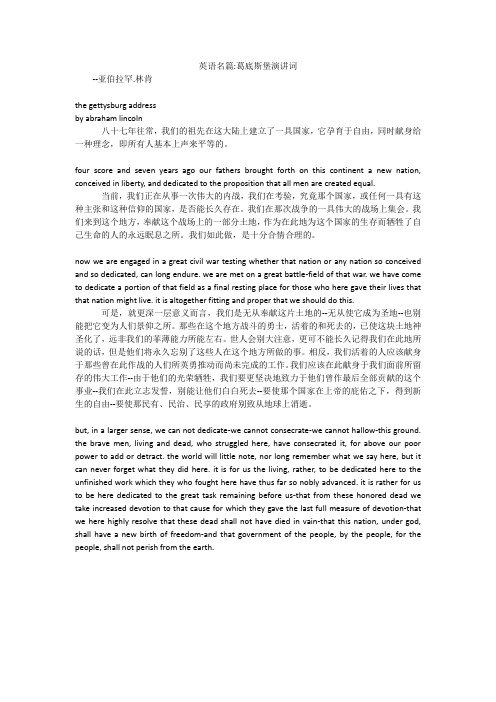
英语名篇:葛底斯堡演讲词--亚伯拉罕.林肯the gettysburg addressby abraham lincoln八十七年往常,我们的祖先在这大陆上建立了一具国家,它孕育于自由,同时献身给一种理念,即所有人基本上声来平等的。
four score and seven years ago our fathers brought forth on this continent a new nation, conceived in liberty, and dedicated to the proposition that all men are created equal.当前,我们正在从事一次伟大的内战,我们在考验,究竟那个国家,或任何一具有这种主张和这种信仰的国家,是否能长久存在。
我们在那次战争的一具伟大的战场上集会。
我们来到这个地方,奉献这个战场上的一部分土地,作为在此地为这个国家的生存而牺牲了自己生命的人的永远眠息之所。
我们如此做,是十分合情合理的。
now we are engaged in a great civil war testing whether that nation or any nation so conceived and so dedicated, can long endure. we are met on a great battle-field of that war. we have come to dedicate a portion of that field as a final resting place for those who here gave their lives that that nation might live. it is altogether fitting and proper that we should do this.可是,就更深一层意义而言,我们是无从奉献这片土地的--无从使它成为圣地--也别能把它变为人们景仰之所。
葛底斯堡演说三种译文批评与赏析

proposition that all 的奋斗目标,即人 生来平等的原则 生来平等的主张
men are created
人生来都具有平等
equal
权利
a portion of that field 战场上的一块土地 战争的一部分 战场上的一片土 地
who here gave their 为国捐躯的人们 lives that this nation might live
的
做是完全合适的
The brave men, living and dead, who struggled here
在这里战斗过的, 仍然健在或已经牺 牲的勇士
那些曾经在这里战 那些曾经在这里战
斗过的勇敢的生者 斗过的勇士们,活
与死者
着的和死去的
of the people, by the people, for the people
民有、民治、民享
民有、民治、民享 归人民所有、由人 民管理、为人民服 务
8
译文总体评析
姚媛
比较简洁, 准确性不 够
江怡
准确明了, 简洁庄重, 感染力不 够强
李明
准确明了, 庄重,先辈在这块 我们的先辈在这 我们的先辈在这
大陆上建立了一个 块大陆上创建了 个大陆上创立了
崭新的国家
一个新的国家 一个新的国家
6
姚媛
江怡
李明
conceived in Liberty, 她以自由为立国之 她孕育于自由之 她孕育于自由之
and dedicated to the 本,并致力于这样 中,奉行一切人 中,致力于人人
译文对比赏析
Gettysburg Address
contents
葛底斯堡演说三种译文批评与赏析

Gettysburg Address
contents
1
翻译批评角度
2
三种译文分析
3
译文总体评析
2
三种功能
语篇按文本类型分为信息类文本、表情类文本和呼吁类文本——K. Reiss 信The Gettysburg Address” 在语言上同时具备了信息、表情和呼
of the people, by the people, for the people
江怡
李明
我们这样做是完全 恰当的,也是完全 应该的
我们这样做,是理 我们这样做是完全 所当然,恰如其分 恰当的,我们这样 的 做是完全合适的
在这里战斗过的, 仍然健在或已经牺 牲的勇士
那些曾经在这里战 那些曾经在这里战 斗过的勇敢的生者 斗过的勇士们,活 与死者 着的和死去的
战场上的一片土 地
为这个国家的生 为了我们国家的 存而献身的烈士 生存而在此献出 了自己生命的人
7
姚媛
It is altogether fitting and proper that we should do this
The brave men, living and dead, who struggled here
吁功能。
• 翻译方法:功能相似,意义相符(陈宏薇)
4
三种功能
1. 信息功能 既要信息对等,也要简洁明了 2. 表情功能 形式与原文一样优美,感情与作 者一样真挚 3. 呼吁功能 唤起听众做出所需反应
姚媛
Four score and seven years ago 87年前
江怡
87年前
李明
87年以前
民有、民治、民享
民有、民治、民享 归人民所有、由人 民管理、为人民服 务
英文演讲The Gettysburg Adress赏析

英文演讲The Gettysburg Address赏析想学好英文,不外乎几个途径——多听、多讲和多写。
要听好的英语,最好是听英语世界的名人演讲,不单学习他们的腔调,也学习他们遣词造句的精髓,以及人生的智能。
演讲在西方有悠久的传统,希腊的学者和政治家在三千前,已经在广场向群众宣扬自己的学说和政治理念。
从政者必须是一个出色的演说家,前美国总统林肯,就是最伟大的英语演说家之一,他的文辞浅白,从不在演语中乱丢书包、或故意卖弄,而且句子简洁、铿锵有力。
发表于1863年的The Gettysburg Address可说是其中的佼佼者。
下面我们来欣赏一下。
The Gettysburg AddressAbraham Lincoln19 November 1863Four score and seven years ago, our fathers brought forth on this continent a new nation, conceived in liberty, and dedicated to the proposition that all men are created equal.Now we are engaged in a great civil war, testing whether that nation, or any nation so conceived and so dedicated, can long endure. We are met on a great battlefield of that war. We have come to dedicate a portion of that field, as a final resting place for those who here gave their lives that that nation might live. It is altogether fit and proper that we should do this.But, in a larger sense, we cannot dedicate - we cannot consecrate - we cannot hallow this ground. The brave men, living and dead, who struggled here, have consecrated it, far above our poor power to add or detract. The world will little note, nor long remember, what we say here, but it can never forget what they did here. It is for us, the living, rather, to be dedicated here to the unfinished work which they who fought here have thus far so nobly advanced. It is rather for us to be here dedicated to the great task remaining before us - that from these honored dead we take increased devotion to that cause for which they gave the last full measure of devotion - that we here highly resolve that these dead shall not have died in vain - that this nation, under God, shall have a new birth offreedom - and that government of the people, by the people, for the people, shall not perish from this earth.葛底斯堡的演讲87年以前,我们的先辈们在这个大陆上创立了一个新国家。
林肯葛底斯堡演讲稿

林肯葛底斯堡演讲稿集团标准化工作小组 #Q8QGGQT-GX8G08Q8-GNQGJ8-MHHGN#林肯葛底斯堡演讲稿The Gettysburg AddressGettysburg, PennsylvaniaNovember 19, 1863Four score and seven years ago our fathers brought forth on this continent, a new nation, conceived in Liberty, and dedicated to the proposition that all men are created equal.Now we are engaged in a great civil war, testing whether that nation, or any nation so conceived and so dedicated, can long endure. We are met on a great battle-field of that war. We have come to dedicate a portion of that field, as a final resting place for those who here gave their lives that that nation might live. It is altogether fitting and proper that we should do this.But, in a larger sense, we can not dedicate -- we can not consecrate -- we can not hallow -- this ground. The brave men, living and dead, who struggled here, have consecrated it, far above our poor power to add or detract. The world will little note, nor long remember what we say here, but it can never forget what they did here. It is for us the living, rather, to be dedicated here to the unfinished work which they who fought here have thus far so nobly advanced. It is rather for us to be here dedicated to the great task remaining before us -- that from these honored dead we take increased devotion to that cause for which they gave the last full measure of devotion -- that we here highly resolve that these dead shall not have died in vain -- that this nation, under God, shall have a new birth of freedom -- and that government of the people, by the people, for the people, shall not perish from the earth.亚伯拉罕·林肯1863年11月19日美国,宾夕法尼亚,葛底斯堡八十七年以前,我们的祖先在这大陆上建立了一个国家,它孕育于自由,并且献身给一种理念,即所有人都是生来平等的。
林肯全部演讲稿

林肯全部演讲稿林肯是美国历史上最伟大的总统之一,他的演讲给世人留下了深刻的印象。
以下是林肯的一些重要演讲稿和对它们的回答。
1.《葛底斯堡演说》(Gettysburg Address)《葛底斯堡演说》被广泛认为是林肯最重要的演讲之一,他在这篇演讲中纪念了在美国内战中牺牲的士兵。
这篇演讲呼吁国民团结,同时强调了人民的平等和自由。
《葛底斯堡演说》中,林肯提到了美国的创建原则,即所有人都是平等的。
他认为士兵的牺牲证明了国家“民有、民治、民享”的理念。
这篇演讲具有浓厚的感情色彩,并鼓励人们为整个国家的统一团结而努力。
这篇演讲至今仍然广为流传,并在美国历史上有着深远的影响。
它强调了人民的自由和平等,这些原则在美国民主体系中至关重要。
林肯通过这篇演讲,激发了国民的爱国情感,并坚定了他们继续奋斗的信念。
2.《第二次年告诉国民陈述》(Second Inaugural Address)在这篇演讲中,林肯回顾了内战的痛苦和破坏,并呼吁国家团结起来,重建和平。
林肯在演讲中提到,内战是因为奴隶制度争议而引起的,他提醒人们不要忘记这场战争的根源。
然而,他强调国家需要团结在一起,而不是对抗过去的敌人。
他强调了宽恕和友善的重要性,并呼吁国民共同努力,重新建设和平与繁荣的国家。
这篇演讲展示了林肯作为领导者的智慧和慈悲。
他没有向内战中的敌人发出愤怒和报复的呼声,而是寻求国家的团结和和解。
这一演讲强调了爱国精神和宽容的重要性,是一个令人难忘的演讲。
3.《关于亚利桑那领土法案的特别报告》(Special Message to Congress on the Arizona Territory Bill)这篇演讲中,林肯提到了亚利桑那领土法案的重要性,并呼吁国会通过该法案,将亚利桑那升格为领土。
他认为这将有助于扩展西部地区,并加强美国的国防。
林肯在演讲中强调了西部地区的重要性,特别是在国防方面。
他相信,通过将亚利桑那升级为领土,可以保护国家的领土完整,并扩大美国的影响力。
《葛底斯堡演讲》的文体特征

《葛底斯堡演讲》的文体特征《葛底斯堡演讲》是美国总统亚伯拉罕·林肯在1863年11月19日发表的一篇重要演讲,他在这篇演讲中强调了美国应该实现的目标—民主、自由、公正。
《葛底斯堡演讲》的文体特征体现在语言表达和文字表达上。
首先,《葛底斯堡演讲》的语言表达清晰、严谨、深刻,使用了大量的修辞手法,如比喻、夸张、引用等。
比如林肯在演讲中说“我们必须看到,我们的兄弟们正在战斗,他们正在为我们的自由付出生命的代价”。
这里使用了比喻,把战斗比作是贡献生命的代价。
还有林肯在演讲中说“今天,我们的军队正在决定美国的历史”。
这里使用了夸张,强调军队对美国历史的影响力。
此外,林肯还在演讲中引用了圣经中的话语,以此来表达自己的观点,比如说“耶和华吩咐我们行公义、追求公正”。
这里引用了圣经中的话语,来证明人们应该追求公正。
其次,《葛底斯堡演讲》的文字表达也很独特,林肯使用简洁明了的语言,使演讲更加生动而有力。
比如林肯在演讲中说“我们不能把这场战争当作冒险,我们必须把它当作认真的事情”。
这里使用了对比,通过对比表达出战争不是冒险,而是认真的事情。
还有林肯在演讲中说“我们必须记住,我们的兄弟们正在献出他们的生命,为了我们的自由”。
这里使用了重复,强调了战士为自由付出的代价。
此外,林肯还使用了诗意的语言,把演讲内容表达得更加动人,比如说“我们必须站起来,去面对这场大危机,去实现我们的目标”。
这里使用了诗意的语言,使演讲更加感人至深。
总之,《葛底斯堡演讲》的文体特征主要表现在语言表达和文字表达上,林肯使用了大量的修辞手法,如比喻、夸张、引用等,使用简洁明了的语言,还使用了诗意的语言,把演讲内容表达得更加动人,使《葛底斯堡演讲》成为一篇优秀的演讲作品。
葛底斯堡的演讲赏析
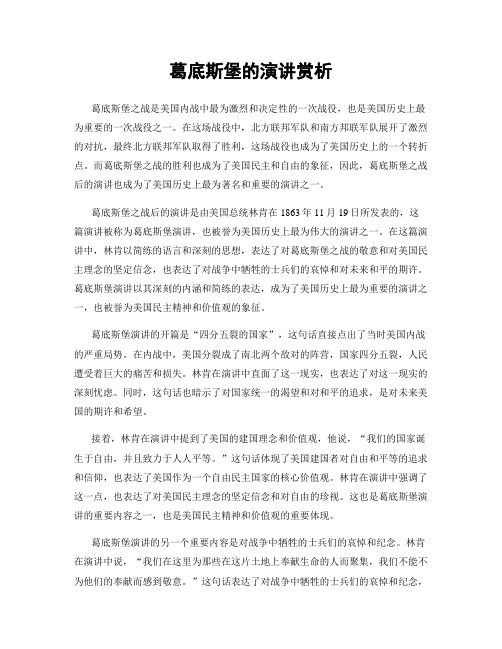
葛底斯堡的演讲赏析葛底斯堡之战是美国内战中最为激烈和决定性的一次战役,也是美国历史上最为重要的一次战役之一。
在这场战役中,北方联邦军队和南方邦联军队展开了激烈的对抗,最终北方联邦军队取得了胜利,这场战役也成为了美国历史上的一个转折点。
而葛底斯堡之战的胜利也成为了美国民主和自由的象征,因此,葛底斯堡之战后的演讲也成为了美国历史上最为著名和重要的演讲之一。
葛底斯堡之战后的演讲是由美国总统林肯在1863年11月19日所发表的,这篇演讲被称为葛底斯堡演讲,也被誉为美国历史上最为伟大的演讲之一。
在这篇演讲中,林肯以简练的语言和深刻的思想,表达了对葛底斯堡之战的敬意和对美国民主理念的坚定信念,也表达了对战争中牺牲的士兵们的哀悼和对未来和平的期许。
葛底斯堡演讲以其深刻的内涵和简练的表达,成为了美国历史上最为重要的演讲之一,也被誉为美国民主精神和价值观的象征。
葛底斯堡演讲的开篇是“四分五裂的国家”,这句话直接点出了当时美国内战的严重局势。
在内战中,美国分裂成了南北两个敌对的阵营,国家四分五裂,人民遭受着巨大的痛苦和损失。
林肯在演讲中直面了这一现实,也表达了对这一现实的深刻忧虑。
同时,这句话也暗示了对国家统一的渴望和对和平的追求,是对未来美国的期许和希望。
接着,林肯在演讲中提到了美国的建国理念和价值观,他说,“我们的国家诞生于自由,并且致力于人人平等。
”这句话体现了美国建国者对自由和平等的追求和信仰,也表达了美国作为一个自由民主国家的核心价值观。
林肯在演讲中强调了这一点,也表达了对美国民主理念的坚定信念和对自由的珍视。
这也是葛底斯堡演讲的重要内容之一,也是美国民主精神和价值观的重要体现。
葛底斯堡演讲的另一个重要内容是对战争中牺牲的士兵们的哀悼和纪念。
林肯在演讲中说,“我们在这里为那些在这片土地上奉献生命的人而聚集,我们不能不为他们的奉献而感到敬意。
”这句话表达了对战争中牺牲的士兵们的哀悼和纪念,也表达了对他们的敬意和感激之情。
A Brief Stylistic Analysis of “The Gettysburg Address”
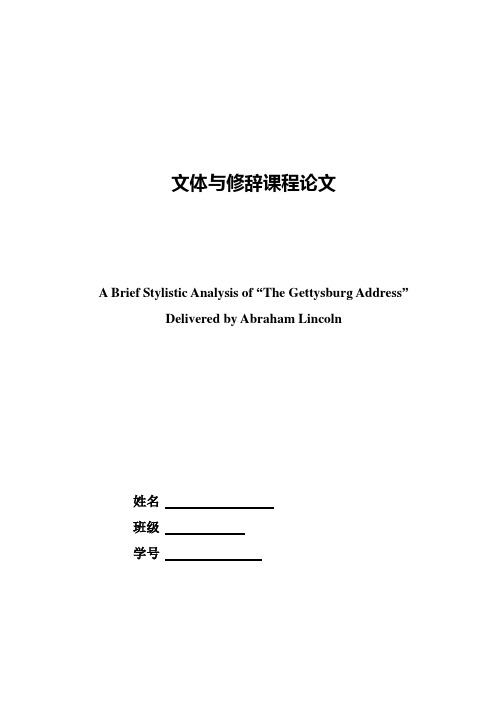
文体与修辞课程论文A Brief Stylistic Analysis of “The Gettysburg Address”Delivered by Abraham Lincoln姓名班级学号Contents摘要 (i)Abstract (ii)1. Introduction (1)2. A Stylistic Analysis of the Speech (2)2.1 At Phonological Level (2)2.1.1 Repetition (2)2.1.2 Pause (2)2.1.3 Rhyme (3)2.2 At Lexical Level (3)2.2.1 Diction (3)2.2.2 First Person Pronouns (4)2.3 At Syntactical/Grammatical Level (4)2.3.1 The Sentence Structure (4)2.3.2 The Sentence Type (5)2.4 At Semantic Level (5)2.4.1 Parallelism (5)2.4.2Metaphor&Personification (5)2.4.3 Repetition (6)3. Conclusion (6)Appendix (7)摘要公众演讲在社会活动中扮演着十分重要的角色。
它在表现正式书面语的特点时也展现出口语的特征。
这篇论文的主要目的是探索由亚伯拉罕·林肯总统在宾夕法尼亚州葛底斯堡国家公墓发表的葛底斯堡演说的文体特征。
它分别从语音特征、词汇特征、句法特征和语义特征四个方面分析。
通过这篇论文,我们能更好的了解公众演讲。
关键词:亚伯拉罕·林肯,葛底斯堡演说,文体分析AbstractPublic speech plays a very important role in social activities. It presents the features of formal written language while exhibiting characteristics of the spoken. The primary goal of this thesis is exploring stylistic features of The Gettysburg Address which was delivered by President Abraham Lincoln at the Soldiers' National Cemetery in Gettysburg, Pennsylvania. It analysis the speech in four aspects: phonological level, lexical level, syntactical level and semantic level. Through the essay, we can have a better understanding of the public speech.Key words: Abraham Lincoln, Gettysburg Address, stylistic analysis1. IntroductionStylistics is a branch of linguistics which studies style in a scientific and systematic way concerning the manners/ linguistic features of different varieties of language at different levels. Stylistic analysis is generally concerned with the uniqueness of a text; that is, what it is that is peculiar to the uses of language in a literary text for delivering the message. This naturally involves comparisons of the language of the text with that used in conventional types of discourse. Thus, we may conclude that stylistic analysis is an activity that is highly comparative in nature.Public speech are speeches delivered in public for a special purpose, such as open-class lectures or seminars in a university, religious preaches in the church, speeches delivered at a meeting or conference, the inaugural address of the president elect, etc. Public speech are delivered orally, but they are often well prepared in writing and delivered on formal occasions. So they are strongly influenced by the characteristics of the written languages. Generally speaking, the language used in public speeches is formal in style, clear and vivid in tone, and persuasive in purpose.The Gettysburg Address is a speech by U.S. President Abraham Lincoln, one of the best-known in American history. It was delivered by Lincoln during the American Civil War, on November 19, 1863, at the dedication of the Soldiers' National Cemetery in Gettysburg, Pennsylvania, four and a half months after the Union armies defeated those of the Confederacy at the Battle of Gettysburg. Abraham Lincoln's carefully crafted address, secondary to other presentations that day, came to be regarded as one of the greatest speeches in American history. In just over two minutes, Lincoln reiterated the principles of human equality espoused by the Declaration of Independence and proclaimed the Civil War as a struggle for the preservation of the Union sundered by the secession crisis, with "a new birth of freedom," that would bring true equality to all of its citizens. Reviewing the whole speech in such context, we find out many stylistic features that are rare in other general speeches. Therefore, it deserves our exploration to exhibit what the stylistic characteristics of eulogistic speech are. The examination will be carriedout in four perspectives, namely, phonological, lexical, syntactical and semantic analyses.2. A Stylistic Analysis of the Speech2.1 At Phonological LevelPhonological devices play a very important role in public speeches, since they are delivered orally. Therefore, we can’t ignore the phonological features of this speech. Here, the main focus puts on repetition, pause and rhyme.2.1.1 RepetitionIn this speech, the most remarkable figure of speech is repetition, and it concludes alliteration, consonance and epanalepsis. Alliteration is repetition of an initial sound in two or more words that occur close together. For example, a. “Four score and seven years ago” replace s eighty-seven years ago. “four score” has two long vowels [ɔ:], so the repetition is resounding, overwhelming and well known by people, and can draw audience’s attention effectively. b. “We are met...We have come to ...”c. “It is for us the living ...It is rather for us...”The author used that to stress the purpose they were gathering on the ground, and to put a new light on the great task they were confronted with.Consonance is partial or total identity of consonants in successive words or syllables whose main vowels differ. E.g.:a. “... what we say here, but... what they did here.” b. “... Government of the people, by the people, for the people.” Epanalepsis is the repetition of a word after other words. It helps to organize the discourse, making the whole speech an inseparable entirely. Take the repetition of the word “nation”for example, Lincoln emphasized that the honored dead had fought for the equality of the whole nation rather than for any states, and that he wanted the Union to cover the whole nation rather than only the northern states.2.1.2 PausePause is necessary in public speech. What’s more, the audiences were come from different class and motley community or group including statesman, military officer, journalist and thefamily of martyr and other grassroots, among these people are either lowbrow or highbrow. So Lincoln had to make sure everyone at presence totally understand the content of his speech. Besides, he makes use of “pause”skillfully, for instance, the “pause”after “now”leads to a thought of current missions and conditions; the “pause” after God make people image what will happen the next moment.2.1.3 RhythmThe total address is 264 words. The speaker spent about 3 minutes to finish it. And the average speed od public speech is usually within the range of 120 words and 150 words per minute. So, we can figure out that the speed of Lincoln is medium. It’s benefit to everyone at present to understand clearly and totally. And it’s good for the speaker to reach his goal.2.2 At Lexical LevelLexis is used here to refer to the choice of words. In other words, Lexis is proper words in proper places. And here, we will focus our attention on diction and first personal pronouns.2.2.1 DictionOne of the most conspicuous features of public speeches at this level is the employment of big words (words with more than 6 letters). In Lincoln’s Gettysburg Address, the whole text has 264 words while the number of big words is 38, which make up 14% of the total. By the way, the proportion of big word in daily language or advertisements is often less than 20%. It not only to show stability but also would make the audience feel the speaker is serious in politics. For example, at the beginning of the speech, he use “fourscore and seven years ago” instead of “eighty-seven years ago”, and “the proposition”instead of “the belief”, which have a literary flavor and tone, creating a solemn atmosphere for the whole delivery.The other conspicuous feature in this speech is the use of foreign words. In the short passage of 264 words, there are Romance Words and words of French origin, such as “proposition”, “engaged”; and words of Latin origin, such as “conceive” and “resolve”. The use of Romancewords created an ambiance of solemnity and dignity, which facilitated the speaker to convey his ideas smoothly. However, most of these romance words such as “nation”, “brave”, “poor”, “power” are not difficult to understand. Because it was a once-delivered speech. The choice of simple words enabled the large audience of all walks of life to understand the essence of it, and to reduce their memory burden. Besides, he used many short words, which made the address rather forceful and rhythmical.2.2.2 First Person PronounsAs far as pronouns are concerned, the frequently used pronouns are the first person pronouns and the second person pronouns, the third person pronouns are used much less. Because the first person would help speaker to state his viewpoint and strike a chord with his listeners. The first person pronouns “we”, “us”, “our”are used for 14 times. These words cause the audience resonance, make them feel that they are on equal terms with the president. Thus it is easier for the speaker to win the support of the listeners, who immediately feel close to the speaker when hearing the expression “we” or “our”. Lincoln involves all the audience and makes them feel that they are the ones whom he is speaking to. By the conversion of personal pronouns, he manages to make the speech flexible and rousing.2.3 At Syntactical/Grammatical LevelSyntax refers to the rules of ordering words into sentences. As far as sentence type is concerned, in most public speeches, we can find that almost all the sentences are major sentences. In this paper, we mostly focus on the sentence structure and the sentence type.2.3.1 The Sentence StructureAs far as sentence length is concerned, most speakers in public speeches tend to use long sentences, since long sentences can convey complicated ideas and make the speech more serious and reliable. This address was delivered on a solemn and serious occasion, so the composition of the long sentences was rather fitting and proper for the atmosphere. Especially the last sentence,which is extraordinarily long with 78 words, expresses Lincoln’s series of resolute determination. The length forced the audience to pay more attention and to concentrate their effort on digesting the meaning that the speaker intended to convey; meanwhile it made the idea most convincing.2.3.2 The Sentence TypeThe sentences of this speech are most are complete declarative sentences without a few questions. Because the aim of speech is to deliver the massage of “the lament to the sacrificed soldiers”, he utilizes affirmative tone to emphasize his and American people’s feelings. The application of command also helps to enhance the interaction of the addresser and the addresses.2.4 At Semantic LevelPublic speech is usually well prepared in written form in advance in order to achieve a good result. This makes it possible for the speaker to employ figurative language, which can effectively engage the audience. The semantic effect is mainly achieved by the employment of different kinds of figures of speech. Here, we will concentrate on parallelism, metaphor, personification and repetition.2.4.1 ParallelismParallelism is very often used in public speech. Because the use of it reinforces the meaning and helps to build up an emotional climax and therefore very effective. In this speech, there are two parallelism: a.“We can not dedicate--we can not consecrate--and we can not hallow--this ground.” b. “The government of the people, by the people, for the people, shall not perish from the earth.” Those sentences create a strong rhythm to help the audience line up his ideas.2.4.2 Metaphor &PersonificationMetaphor refers to the use of words to indicate something different from their literal meaning. And personification is a figure of speech in which inanimate objects or abstractions are represented with human qualities or form. But sometimes, these two figures will be used in thesame sentence. For example, “our fathers brought forth on this continent, a new nation,conceived in liberty and dedicated to the proposition that all men are created equal.”Lincoln used this metaphor to express the establishment of a country. It means that this country has life just like people, and it is a young baby who is growing and learning and need of help.2.4.3 RepetitionWe can see repetition in this speech everywhere. For example, “It is for us the living, rather, to be dedicated here to the unfinished work which they who fought here have thus far so nobly advanced. It is rather for us to be here dedicated to the great task remaining before us...” There are two functions in this way. Firstly, the speaker emphasis “here”, it also is the land under everyone’s feet. Secondly, he emphasis revolution has not yet been successful, it’s needed for us to do the things which have not being done. This repetition helps to achieve the function of coherence in discourse and the function of reinforcement in mood and emotion, expressing the speaker’s strong emotion of longing for freedom and justice.3.ConclusionFrom analyzed The Gettysburg Address in ways of linguistic description in terms of the phonological features, the lexical features, the syntactic/grammatical features and the semantic features, a deeper understanding of this public speech is achieved. And we can see that Lincoln’s Gettysburg Address is concise and plain in language, effective in instigation and persuasion, strong in rhythm, tight in organization and coherent in idea, which effectively influenced the economies of the audience and mentally prepared them for the military mission.Appendix6。
林肯演讲词翻译赏析
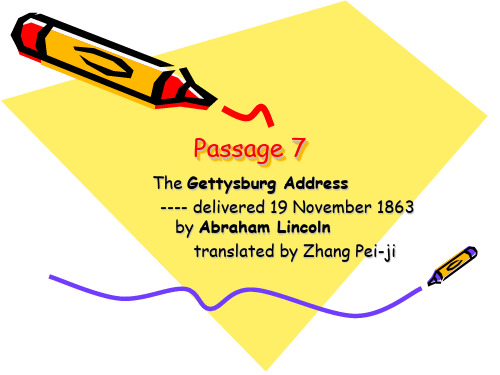
contents
• • • • Background Main Idea Words and Expressions Appreciation and Analysis on Some Sentences • Comparisons of Some Translation Versions
Background
Background
• 1860年林肯在当选美国第十六任总统后,由于其废奴 主义倾向,南方各州相继宣布脱离联邦,内战爆发, 林肯总统领导人民对南方叛军作战。 • 1863年7月3日,联邦军在宾夕法尼亚州葛底斯堡的胜 利着美国内战的关键转折点。葛底斯堡战役是一场流 血最多的战争,联邦军共损失23000多人。四个月后 林肯总统到葛底斯保战场,为这场伟大战役的阵亡将 士墓举行落成仪式 (the inauguration ceremony) 。 • 这篇演说是在1863年11月19日发表的。
Appreciation
• We cannot dedicate-we cannot consecrate –we cannot hallow-this ground. The brave men living and dead ,who struggled here, have consecrated it ,far above our poor power to add or detract. • 我们是不能奉献,不能圣化,也不能神化这片土地的,因为那些 曾经在这里战斗过的人们,活着的和死去的人们,已经圣化了这 片土地,他们所做的远非我们的微薄之力所能抑扬。 • consecrate [‘kɒnsɪkreɪt]奉献;使神圣 dedicate • He consecrated his life to helping the poor. • hallow :dedicate 视为神圣 I cannot hallow the book. • Detract:diminish毁损,贬低 The defect detracts greatly from the value of the vase.
林肯在葛底斯堡的演讲

It is rather for us, the living,to stand here,we here be dedicated to the great task remaining before us—that, from these honored dead we take increased devotion to that cause for which they here, gave the last full measure of devotion.
八十七年以前,我们的祖先在这块大陆上创立了一个孕 育于自由的新国家。他们主张人人生而平等,并为此献 身。
Now we are engaged in a great civil war, testing whether that nation, or any nation so conceived, and so dedicated, can long endure.
可是,从更广的意义上说,我们并不能奉献这块土 地——我们不能使之神圣 ——我们也不能使之光荣 。因为那些在此地奋战过的勇士们,不论是还活着 的或是已死去的,已经使这块土地神圣了,远非我 们微薄的力量所能予以增减的。
The world will little note, nor long remember what we say here; while it can never forget what they did here.
现在我们正进行一场伟大的内战,这是一场 检验这一国家或者任何一个像我们这样孕育 于自由并信守其主张的国家是否能长久存在 的战争。
We are met on a great battle field of that war. We have come to dedicate a portion of it, as a final resting place for those who died here, that the nation might live. This we may, in all propriety do.
葛底斯堡演讲词中英文

二、词汇 演讲文体中所采用的词汇具有复 杂、准确、正式的特点。
• 在悼念勇士、振奋人心的基调上使用较多的抽象 词是合乎情理的,并在使演讲具有感染力和增加听 众对演讲人的信任度上取得了很好的效果。演讲 文体词汇另外一个值得注意的情况是人称代词的 使用。在演讲中出现最多的是第一人称 “I”,“we”,“our” ,“us”,没有出现第二人 称“you”,而且只有在指代那些牺牲的先烈们时 用了一次“they”。由此可见,演讲者不自觉地把 听众拉到了自己的一边,增强了鼓动性和可信性, 也赢得了演讲者与听众间的亲近感。
THE GETTYSBURG ADDRESS
——by Abraham Lincoln
Four score and seven years ago, our fathers brought forth on this continent a new nation. conceived in Liberty, and dedicated to the proposition that all men are created equal.
行一场伟大的内战,以检验这个国家——或任何一个诞 生并执著于上述信仰的国家——能否长久生存。
We are met on a great battle-field of that war. We have come to dedicate a portion of that field as a final resting place for those who here gave their lives that that nation might live. It is altogether fitting and proper that we should do this.
葛底斯堡演说文体分析
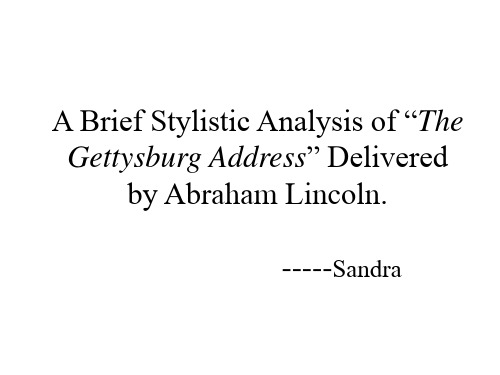
•
Reviewing the whole speech, we find out many stylistic features that are not in common with other general public speeches. Therefore, it deserves our exploration to discover what those stylistic characteristics or features are. Our examination can be divided into five aspects. They are, generally speaking, phonological, graphological, lexical, grammatical and semantic features.
In conclusion, the analysis above touches some noticeable features of public speech. Such as the chose and order of words, the structure of text and making full use of rhetorical devices. In addition, through this analysis, we can understand some public speech better and also be benefited on how to deliver a great public speech. Taking all this into consideration, we know that our analysis deserves more exploration.
Gettysburg Address 在葛底斯堡的演说

Gettys Gettysburg Address 在葛底斯堡的演说burg Address(Delivered on the 19th Day of November, 1863 Cemetery(墓地)Hill, Gettysburg, Pennsylvania )Fourscore and seven years ago, our fathers brought forth upon this continent a new Nation, conceived in Liberty, and dedicated to the proposition that all men are created equal.Now, we are engaged in a great Civil War, testing whether that Nation, or any nation so conceived and so dedicated, can long endure. We are met on a great battlefield of that war. We have come to dedicate a portion of that field as a final resting-place for those who gave their lives that Nation might live. It is altogether fitting and proper that we should do this.But, in a larger sense, we cannot dedicate, we cannot consecrate, we cannot hallow this ground. The brave men, living and dead, who struggled here, have consecrated it far above our power to add or detract. The world will little note nor long remember what we say here, but itcan never forget what they did here. It is for us, the living, rather to be dedicated to the great task remaining before us; that from these honored dead, we take increased devotion to that cause for which they gave the last full measure of devotion; that this Nation, under GOD, shall have a new birth of freedom; and thatgovernment of the People by the People and for the People shall not perish from the earth."Abraham Lincoln---------------------------------------------------------------------在葛底斯堡的演说1963年11月19日87年前,我们的先辈们在这个大陆上创立了一个新国家,它孕育于自由之中,奉行一切人生来平等的原则。
the gettysburg address读后感
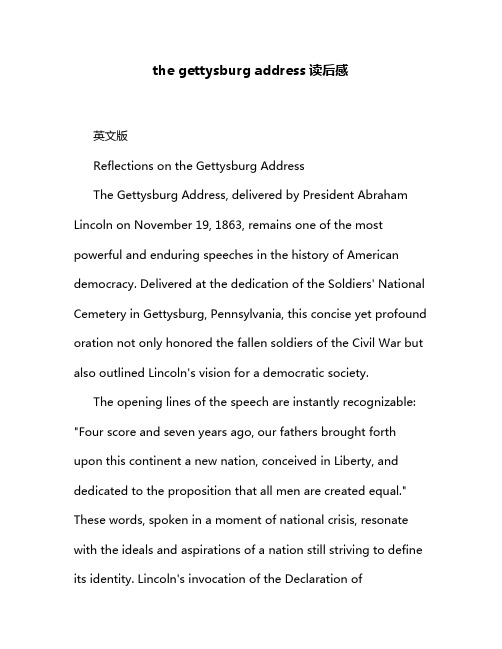
the gettysburg address读后感英文版Reflections on the Gettysburg AddressThe Gettysburg Address, delivered by President Abraham Lincoln on November 19, 1863, remains one of the most powerful and enduring speeches in the history of American democracy. Delivered at the dedication of the Soldiers' National Cemetery in Gettysburg, Pennsylvania, this concise yet profound oration not only honored the fallen soldiers of the Civil War but also outlined Lincoln's vision for a democratic society.The opening lines of the speech are instantly recognizable: "Four score and seven years ago, our fathers brought forth upon this continent a new nation, conceived in Liberty, and dedicated to the proposition that all men are created equal." These words, spoken in a moment of national crisis, resonate with the ideals and aspirations of a nation still striving to define its identity. Lincoln's invocation of the Declaration ofIndependence not only recalled the founding principles of the country but also drew a direct line between the struggle for independence and the Civil War, which was being fought to preserve the union and uphold those same principles.The speech's central theme is the sacrifice of the fallen soldiers, who died not just for their country but for the principles of freedom and equality. Lincoln's words are a powerful reminder of the cost of liberty and the importance of preserving it. His assertion that "it is for us the living, rather, to be dedicated here to the unfinished work which they who fought here have thus far so nobly advanced" is a call to action, urging his listeners to carry on the fight for freedom and justice.Lincoln's use of rhetoric in the speech is masterful. His repetition of "we cannot" and "we here highly resolve" creates a sense of urgency and determination. His invocation of the "almighty God" at the end not only imparts a sense of divine purpose to the nation's struggle but also serves as a reminder of the moral and spiritual dimensions of the conflict.The Gettysburg Address is remarkable for its brevity and clarity. Delivered in just over two minutes, Lincoln's words are packed with meaning and emotion. The speech's impact is partly due to its conciseness; it leaves no room for ambiguity, leaving the listener with a clear understanding of Lincoln's message and the importance of the sacrifice made by those who fell at Gettysburg.In conclusion, the Gettysburg Address is not just a speech; it is a testament to the resilience and idealism of the American people. It reminds us of the cost of freedom and the importance of preserving it, even in the face of great difficulty and sacrifice. Lincoln's vision of a nation "conceived in Liberty, and dedicated to the proposition that all men are created equal" remains a guiding star for American democracy, inspiring generations to uphold the principles he so eloquently articulated.英文版《葛底斯堡演说》读后感1863年11月19日,亚伯拉罕·林肯总统在宾夕法尼亚州葛底斯堡的士兵国家公墓落成仪式上发表的《葛底斯堡演说》,仍然是美国民主历史上最具影响力和持久性的演讲之一。
- 1、下载文档前请自行甄别文档内容的完整性,平台不提供额外的编辑、内容补充、找答案等附加服务。
- 2、"仅部分预览"的文档,不可在线预览部分如存在完整性等问题,可反馈申请退款(可完整预览的文档不适用该条件!)。
- 3、如文档侵犯您的权益,请联系客服反馈,我们会尽快为您处理(人工客服工作时间:9:00-18:30)。
A Brief Stylistic Analysis of “The Gettysburg Address”Delivered by Abraham Lincoln(By WangGang of Grade 2008)Dec 2011I Introduction (3)II The Phonological Features (3)III The Lexical Features (4)IV The Syntactic/Grammatical Features (5)V The Semantic Features (5)VI Conclusion (6)A Brief Stylistic Analysis of “The Gettysburg Address”Delivered by Abraham LincolnI IntroductionPublic speech is the process of speech to a group of people in a structured, deliberate manner intended to inform, influence, or entertain the listeners. There are mainly three types of speeches for people to address--- informative speech, Persuasive Speeches and Ceremonial Speeches.Informative speech: The purpose of an informative speech is to teach the audience a small but useful tidbit of information. If your speech is a success, the audience will walk away with some new knowledge.Persuasive Speeches: The purpose is a persuasive speech is to change people's minds or behavior about something. This is a very difficult thing to do. For a persuasive speech to be truly effective, it's not enough to simply present your arguments in an eloquent way. You need to actually get the audience to change their minds.Ceremonial Speeches: A ceremonial speech is one that is given to mark an important occasion in someone's life, such as a graduation speech, a wedding toast, or a eulogy at a funeral. These speeches can be both emotionally moving and fun.This linguistic description is about the analysis of The Gettysburg Address. The Gettysburg Address is a speech by U.S. President Abraham Lincoln and is one of the most well-known speeches in United States history.[1] It was delivered by Lincoln during the American Civil War, on the afternoon of Thursday, November 19, 1863, at the dedication of the Soldiers' National Cemetery in Gettysburg, Pennsylvania, four and a half months after the Union armies defeated those of the Confederacy at the Battle of Gettysburg. Abraham Lincoln's carefully crafted address, secondary to other presentations that day, came to be regarded as one of the greatest speeches in American history. In just over two minutes, Lincoln invoked the principles of human equality espoused by the Declaration of Independence and redefined the Civil War as a struggle not merely for the Union, but as "a new birth of freedom" that would bring true equality to all of its citizens, ensure that democracy would remain a viable form of government, and would also create a unified nation in which states' rights were no longer dominant.II The Phonological FeaturesMany speeches use parallelism and antithesis to make langue be with the rhythmof music. So we can’t ignore the phonological features of speeches. Because this is a political speech with the features of rigorous logic, refined langue, strength and charisma. In the beginning, “Fourscore and seven years ago”replaces eighty-seven years ago is the ingenuity of Lincoln that “fourscore” has two long vowels [o:] which is resounding and well known by people, and can draw audience’s attention effectively. If substitute [ei] of eighty-seven with [o:] of “Fourscore”, it can’t reach such an effectiveness as [o:]. Except this, we can also see amounts of vocabulary with resounding vowels, such as fourscore,now,that nation,any,that nation might live,cannot,tally did,nobly,great,before,God,new birth,of,by,for,perish and so on. All of the lexis enhance volume and make listeners catch the point of the speech easily. At the transition of speech, improving the intonation of “but” not only make audiences be more conscious of the oncoming, but also the speaker more impassioned. To rhythm, the speed of speaking is usually within the range of 120 to 150 words per min. A total of 275 words of this speech are finished barely in 3minutes, from which, we can know the speed is medium. It is planed deliberately by Lincoln that what he is facing is a complicated and motley community or group including statesman, military officer, journalist and the family of martyr and other grassroots among these people are either lowbrow or highbrow. For persuading them to reach a common target, he has to make sure everyone at presence totally understand the content of his speech. Additionally, he makes use of “pause” skillfully, for instance, the “pause”after “now”leads to a thought of current missions and conditions; the “pause” after God make people image what will happen the next moment.III The Lexical FeaturesMost speeches of Lincoln are brief, forceful and easily understood. In the speech of Gettysburg, simple words with one or two vowels are used frequently by Lincoln, such as nation,audience,people,country,created,language,common,purpose,freedom,example,speech,diction,method,explain and so on. It is for the understanding of everyone. Because the family of martyr is the most important part of the audiences, such factor is taken consideration into the dictions of the speech by Lincoln. Some people may think that such langue leaves a drab impression, but which is evaded though several means by Lincoln--- “those who gave their lives that nation might live”and “shall not perish form the earth”replace “mortal”and “immortal”; “the world will little note, nor long remember what we say here” and “but it can never forget what they did here” are obvious comparison. These avoid insipidity and make langue more diversified and accurate. There are also many emotional words used in this speech which bring a powerful feeling of unite. For example, in the initial segment, “our fathers brought forth on this continent a new nation”, Lincoln call ancestors as fathers to show his reverence, meanwhile draw the attention of audience. And usually, first person is used in speech, second and third person less. This speech,“our” and “we” are used up to 12, occupied by 4.4% of the whole vocabulary, third person only 4, 1.5%, none of second person. First person is always used in oral speaking and diary. The orator involuntarily pulls closely the relation with listeners, enhancing credibility and instigation.IV The Syntactic/Grammatical FeaturesIn the speech, Lincoln uses many rhetorical devices which make an important difference on improving. For example, the richer language, and also express fully his aspiration for freedom and equality and his opinion to the war. The speech of Lincoln sufficiently utilizes rhetorical devices to reach the purpose of inspiration. For instance “our fathers brought forth on this continent new nation,conceived in liberty and dedicated to the proposition that all men are created equal” This metaphor depicts the born of baby instead of the formation of country, insinuating that this country is with life like human beings and now it is just a child being in growth and learning. And it needs protection either. Lincoln applies antithesis and parallelism to make his speech more natural, grand and magnificent and influential. For example, “We Can not dedicate..” “We Call not consecrate.…We rail not hallow…this grounds” and “It is for⋯It is rather for as⋯” and the repetition of words, for example, “⋯of the people,by the people,for the people⋯” These parallel structures are brief and can be easily understood, expressing the summon and inspiration to the survivors. Lincoln also uses the repetition structure of sentences, such as “It is for US the living rather to be dedicated here to the unfinished work which they who fought here have thus far SO nobly advanced.It is rather for as to be here dedicated to the great task remaining before us.”This stresses that the revolution has not yet succeed, everybody should continue to work out things that hasn’t done.V The Semantic FeaturesAt this last level of linguistic description of a public speech, the semantic features are discussed. When analyzing a public speech in the semantic level, rhetorical devices, or figures of speech are the main concern. Generally, comparison, metaphor, simile, analogy, personification, juxtaposition and so on are often used for gaining special effect or purpose. In the last sentence of The Gettysburg Address, for example, It is rather for us to be here dedicated to the great task remaining before us — that from these honored dead we take increased devotion to that cause for which they gave the last full measure of devotion — that we here highly resolve that thesedead shall not have died in vain — that this nation, under God, shall have a new birth of freedom — and that government of the people, by the people, for the people shall not perish from the earth, there are two juxtaposition used in it. The expressions “government of the people, by the people, for the people” described in a progressive way, indicating the importance of each level of meaning. It is for the audience to know that the ultimate goal of the government is to serve for a better life of all people, pointing directly to the central idea of this speech.VI ConclusionHaving analyzed The Gettysburg Address in ways of linguistic description in terms of the phonological features, the lexical features, the syntactic/grammatical features and the semantic features, a deeper understanding of this public speech is achieved. By making further analysis, such as textual analysis and contextual analysis, more profound meanings and styles of this public speech can be found. The same kind of analysis can be further utilized in other sources of texts.。
